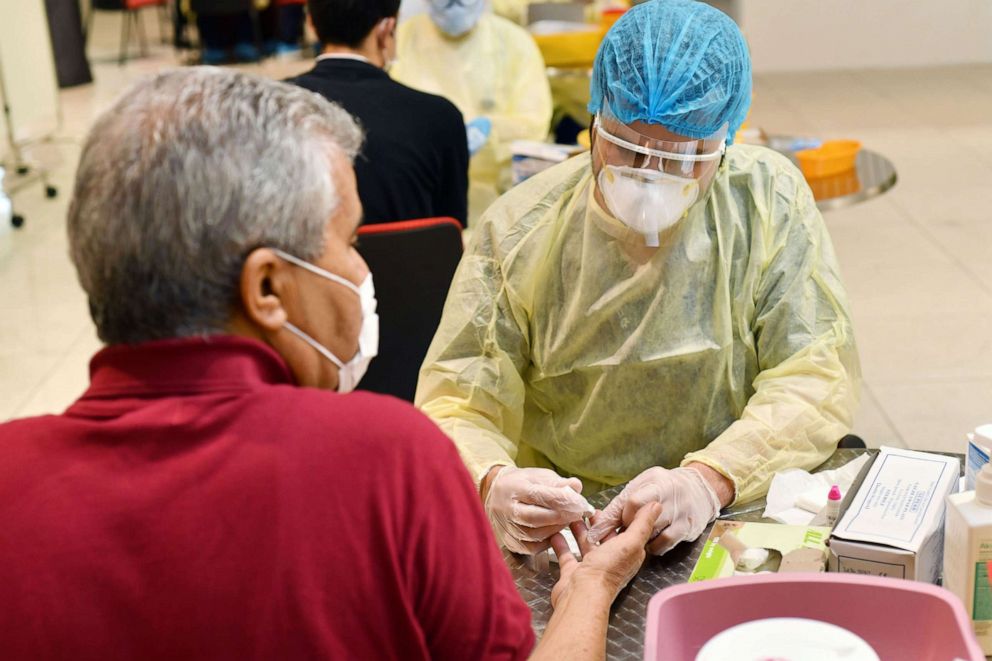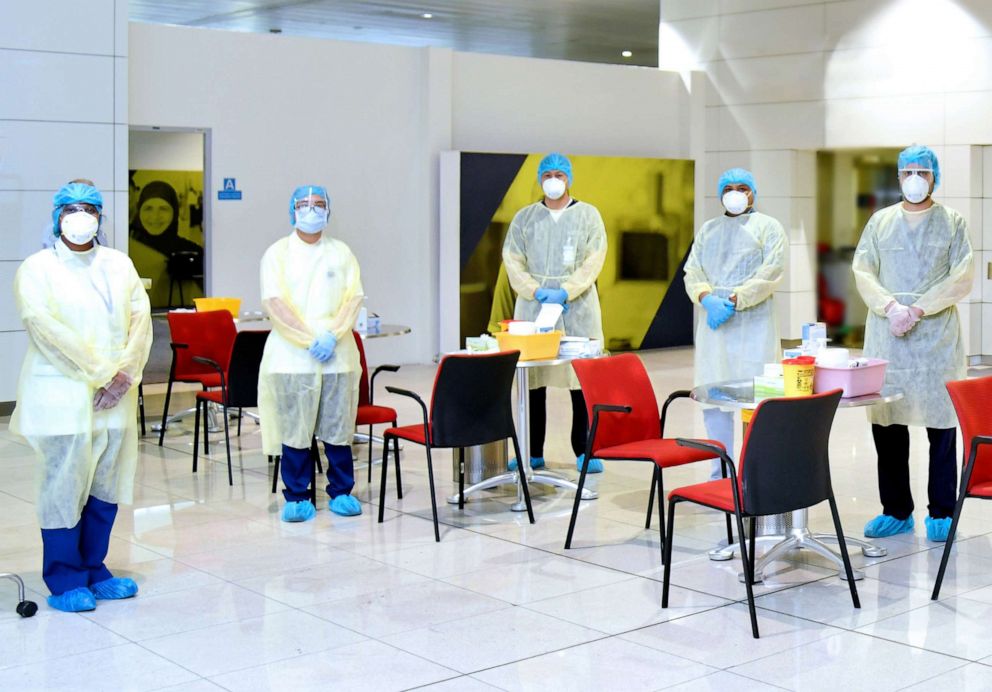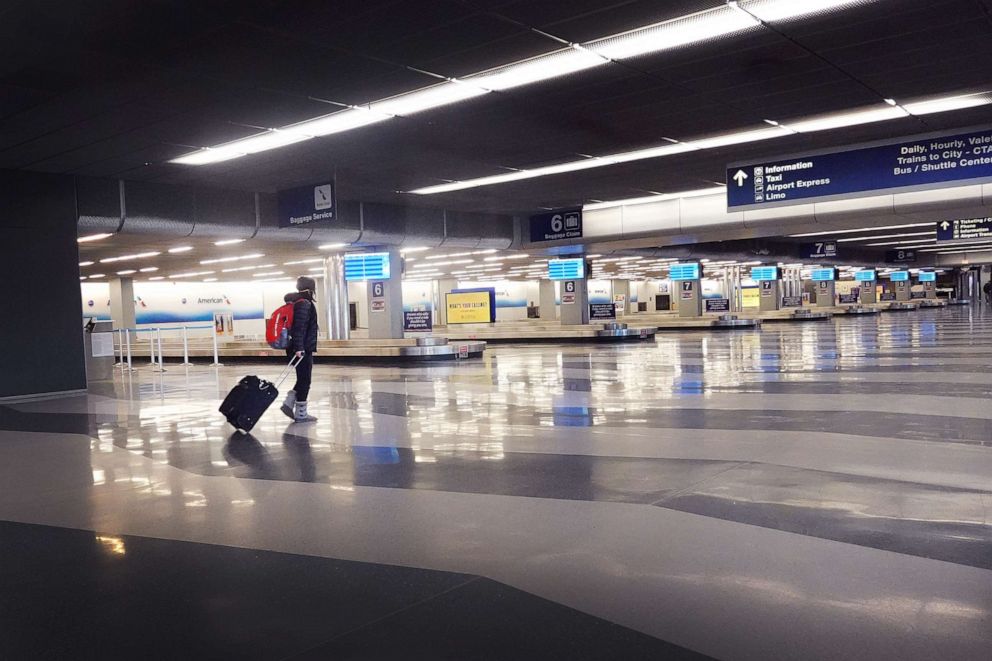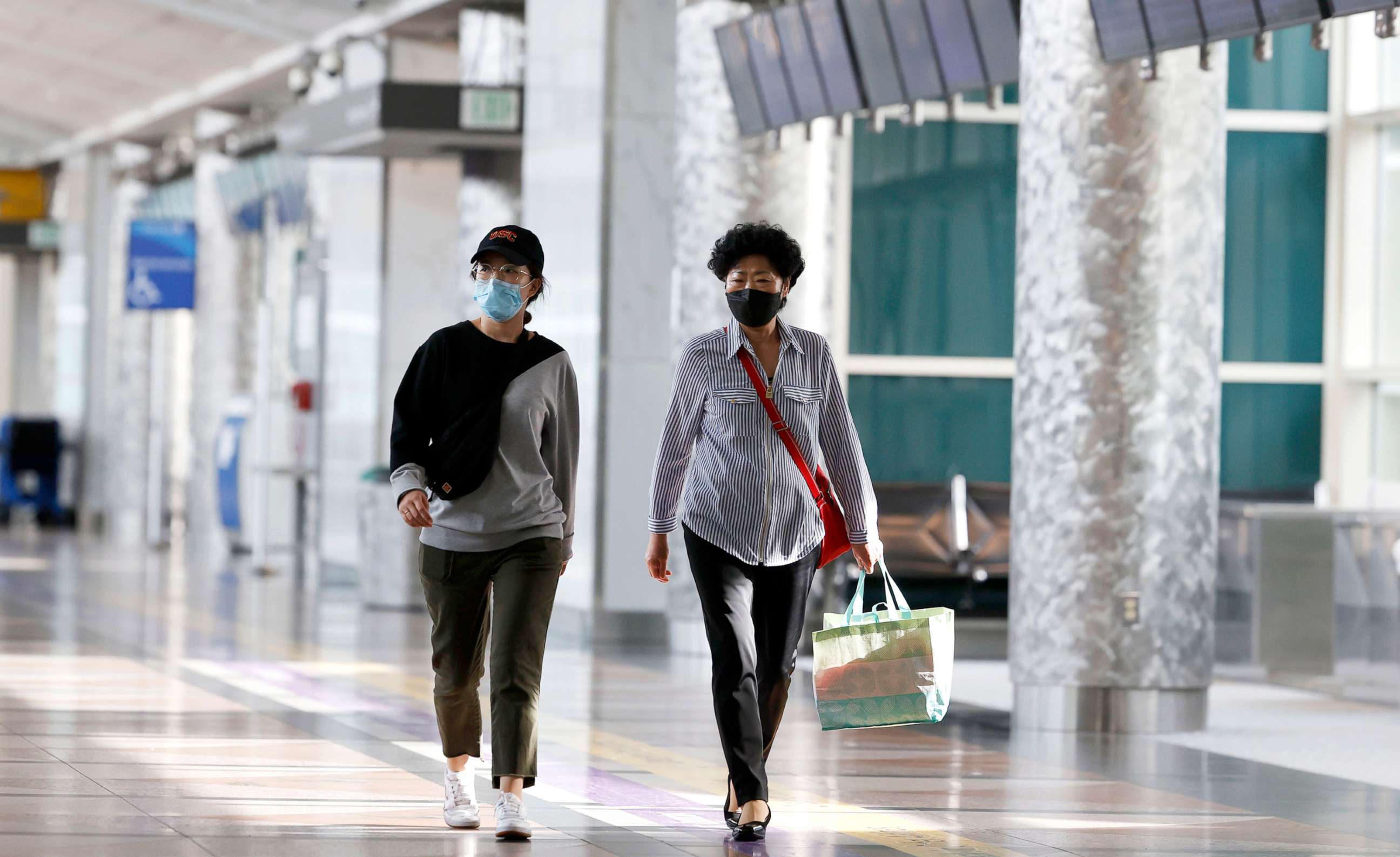Would airport coronavirus testing get people flying? Not alone, experts say
Some foreign flights test travelers, but experts skeptical about practicality.
In addition to the usual check-ins and security checks, travelers flying on Emirates to Tunisia from the Dubai International Airport last month underwent a novel new screening before they were allowed on board: a rapid coronavirus blood test.
While in the U.S. airlines institute a patchwork of measures like mandatory masks and temperature screenings in attempts to safeguard their passengers and crew, virus testing is already being conducted for a small number of travelers by airlines or in airports in a few foreign countries in some of the first steps in hopes of buoying an industry that has been decimated by the pandemic.
But while the new protocols could help bring some travelers a measure of comfort, aviation and public health experts said that tests are unlikely to be the silver bullet that will revive the industry in the near term.
"It's a wonderful soundbite and a photo opportunity," John Grant, a senior aviation analyst with aviation data firm OAG, told ABC News. "But the practicalities of administering such a process when you have literally tens of thousands of people arriving in a two or three hour window, and segregating them, socially distancing them, and administering such a process, seems to be unworkable."

Some new testing around the world
Emirates, the state-owned carrier based in the United Arab Emirates, said in April it was the first airline to test passengers for the virus before their flight, and had results available within ten minutes. Working with the Dubai Health Authority, it said it hoped to expand the procedure to additional flights in the coming weeks.
The testing measure would complement other safety steps the airline is taking from temperature screenings of all passengers and employees, to physical distancing indicators, to "enhanced aircraft cleaning and disinfecting."
In Austria, the Vienna International Airport started voluntary diagnostic tests for travelers entering and leaving the country. For € 190, about $206, travelers can schedule a PCR test that is designed to look for traces of the virus in samples -- and get their results within three hours -- along with a certificate that proves they tested negative.
Tune into ABC at 1 p.m. ET and ABC News Live at 4 p.m. ET every weekday for special coverage of the novel coronavirus with the full ABC News team, including the latest news, context and analysis.
Hong Kong has been testing all incoming air travelers since late April, shuttling them from the international airport to a nearby testing center, before they enter mandatory self-quarantine, which is enforced using electronic bracelets.

As other countries begin to reopen, expanded testing and even “immunity passports” to certify a traveler’s health are increasingly seen by some as tools to help bring travelers back to the skies worldwide.
“We need a vaccine, an immunity passport or an effective COVID-19 test that can be administered at scale,” Alexandre de Juniac, the director general and CEO of International Air Transport Association, which represents nearly 300 airlines and 82 percent of the world’s total air traffic, said in a recent statement on safety recommendations.
But with the U.S. still rationing COVID-19 tests for front line workers and vulnerable populations in some communities, it’s unlikely that the country’s airlines will be in a position to test passengers for the highly-contagious disease anytime soon, experts told ABC News.
The U.S. is conducting roughly 250,000 tests each day, but some public health experts have said daily testing capacity needs to be doubled or tripled to consider reopening the country safely. Testing flyers would be an additional, monumental undertaking on its own -- nearly 2.5 million people passed through TSA checkpoints to travel in a day last May.
“Without testing, we’re really flying blind when it comes to the virus, and where the virus is and where it’s going,” Dr. Anand Parekh, the chief medical advisor at the Bipartisan Policy Center and former Department of Health and Human Services official, told ABC News about the importance of testing generally.

The nature and quality of some tests is also a concern to some experts.
Emirates referred ABC News' questions about the testing program -- including what specific tests were used and the current status of the program -- to the Dubai Health Authority. Officials at the authority, as well as UAE embassy officials, did not provide comment as of this report.
Experts suggested that the “quick blood tests” referred to in the April press release are likely antibody tests that screen for the presence of prior COVID-19 exposure, rather than current infection.
“The virus is almost never in the blood. So you have to get the nose or throat swab to find the virus. If they're only using blood, then it would be an antibody test,” Dr. Daniel Lucey, a member of and spokesman for the Infectious Disease Society of America (IDSA), an association of 12,000 public health experts, told ABC News. “I don't think [an antibody test] would provide anything reliable, any information that's reliable."
"There's a lot we don't know about antibody testing,” said Dr. Angela Caliendo, a professor and vice chair of Medicine at Brown University’s medical school, , who sits on IDSA's board of directors and often serves as an infectious disease expert panelist for the group’s virtual media briefings on COVID-19. "We don't have the data at all to suggest that if you have antibodies, you're not infectious, if you have antibodies, you're protected from infection.”
The World Health Organization has raised concerns about the use of antibody tests for “immunity passports,” given the lack of evidence that people who have recovered from COVID-19 are immune.
For diagnostic tests that are designed to detect current infections, the possibility of some false-negative tests could also allow infected travelers slipping through the cracks, Laura Albert, an industrial and systems engineering professor at the University of Wisconsin-Madison, told ABC News.
“There will be a small proportion of passengers who will fit in that bucket,” she said, adding that asymptomatic passengers could also be a concern.
In the air over the US, a patchwork of policies
For now in the U.S. currently no airports or airlines are conducting any coronavirus tests for travelers.
But airlines have implemented a range of social distancing and mitigation measures, including mandatory mask-wearing, and temperature checks for patients.
On Monday, American Airlines, Alaska Airlines and Southwest Airlines began requiring mask-wearing for both passengers and the airplane crew.
The three U.S. airlines now join the ranks of competitors who've already made masks a requirement: Air Canada, United Airlines, Delta Airlines, JetBlue Airways, Lufthansa Group, Cape Air and Frontier Airlines, the latter of which will be the first airline to require mandatory temperature checks beginning June 1.
Frontier, which dropped plans to charge passengers $39 to guarantee social distancing, recently rolled out a new temperature check program. The mandatory checks will screen both passengers and crew members, and prevent anyone from boarding with a temperature of 100.4 degrees Fahrenheit or greater.
The hodgepodge system of safety measures and screenings has frustrated Democrats on Capitol Hill, who are pushing the Trump administration to set a required standard for the entire industry to follow.

Airlines for America, the trade organization representing the country’s largest carriers, called for temperature checks to be conducted by Transportation Security Administration workers at airports on travelers and “customer-facing employees” for the duration of the coronavirus outbreak.
"As all screening processes for the traveling public are the responsibility of the U.S. government, having temperature checks performed by the TSA will ensure that procedures are standardized, providing consistency across airports so that travelers can plan appropriately," the group said in a statement.
While temperature checks were among the earliest coronavirus mitigation measures implemented on travelers this year -- specifically on international travelers arriving to the United States -- the screenings can still miss infections in people who have yet to show symptoms, or are asymptomatic.
Despite some reports of recent crowded flights, even were the U.S. to institute robust and accurate testing, it’s unlikely that air travel will return to pre-pandemic levels any time soon without a widely-distributed vaccine, according to public health experts and aviation analysts.
In China and Australia, where new COVID-19 cases have dwindled, domestic air travel demand remains low, at 40 percent and ten percent of pre-COVID-19 levels, respectively, according to the IATA.
"The new normal is probably very akin to 9/11," said Grant. "There was a great deal of uncertainty, and concern, quite rightly, amongst passengers that wanted to feel safe and feel comfortable, and in the space of two or three months, we began to see traffic building back up, and demand recover."
Absent a vaccine, Grant said that air travel could slowly increase as travelers become more comfortable with safety and health protocols, "although they will take a long time to get back to where they were in 2019, for sure."
Some would-be travelers may stay home if they're worried about the possibility of contracting COVID-19 at their destination, or on another leg of their trip,Robert Mann, an aviation analyst, told ABC News.
“People are very sensitive to their personal safety. They will not travel, or if they have to travel, will exclude a means of travel, if they don’t think it’s safe,” he said.
What to know about the coronavirus:
- How it started and how to protect yourself: Coronavirus explained
- What to do if you have symptoms: Coronavirus symptoms
- Tracking the spread in the U.S. and worldwide: Coronavirus map




